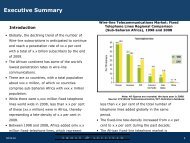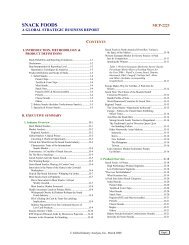the RUSSIA oil & gas competitive intelligence report - Report Buyer
the RUSSIA oil & gas competitive intelligence report - Report Buyer
the RUSSIA oil & gas competitive intelligence report - Report Buyer
You also want an ePaper? Increase the reach of your titles
YUMPU automatically turns print PDFs into web optimized ePapers that Google loves.
Russia Oil and Gas Competitive Intelligence <strong>Report</strong> 2010<br />
charge Lithuania US$320/mcm over 2010. An average realised <strong>gas</strong> price paid by Gazprom's non-FSS<br />
European customers in H110 was just below US$300mcm, with most FSS states paying significantly less.<br />
Gazprom argues that owing to <strong>the</strong> small absolute volumes consumed by <strong>the</strong> Baltic states, it needs a price<br />
premium to make supplying <strong>the</strong> region worthwhile.<br />
Gazprom has managed to keep a presence in all <strong>the</strong> Baltic markets following <strong>the</strong> break-up of <strong>the</strong> Soviet<br />
Union and owns about a third of <strong>the</strong> national <strong>gas</strong> companies of Estonia (37%), Latvia (34%) and<br />
Lithuania (34%). The more Russia-friendly Latvia appears to be content with <strong>the</strong> status quo for <strong>the</strong> time<br />
being. Its two neighbours, however, have become decisively uncomfortable in Gazprom's grip. The Nord<br />
Stream subsea pipeline from Russia to Germany, bypassing <strong>the</strong> Baltics, has only raised Vilnius and<br />
Tallinn's energy security fears.<br />
As an alternative to Gazprom's supplies Lithuania is pushing <strong>the</strong> Amber pipeline project. In its revised<br />
form <strong>the</strong> 5bcm pipeline will link <strong>the</strong> country with Poland's planned LNG terminal. The Świnoujście<br />
terminal is due onstream in around 2015. For <strong>the</strong> foreseeable future, however, Lithuania's dependence on<br />
Russian <strong>gas</strong> looks solid. The same applies to even greater extent to Estonia. Until <strong>the</strong> two countries<br />
develop tangible supply alternatives, brinksmanship with Gazprom could lead to some long cold Baltic<br />
nights.<br />
Azerbaijan<br />
In March 2009 Gazprom and Azerbaijan's state-owned Socar signed an MoU for <strong>the</strong> delivery of a<br />
minimum of 500Mcm of Azeri <strong>gas</strong> to Russia a year starting in January 2010. A final binding agreement<br />
followed in October 2009. Socar's CEO Rovnag Abdullayev said following <strong>the</strong> deal that Azerbaijan<br />
would export 1bcm of <strong>gas</strong> to Russia from January 2010. The exported <strong>gas</strong> will be sourced from <strong>the</strong> first<br />
phase of Azerbaijan's Shah Deniz field. At a later stage, Russia may also import <strong>gas</strong> from Shah Deniz's<br />
second phase. Gas from this project has also been earmarked for <strong>the</strong> EU-backed Nabucco pipeline project,<br />
which is intended to supply Europe bypassing Russia.<br />
In January 2010 Gazprom announced plans to double <strong>gas</strong> imports from Azerbaijan to 2bcm from 2011.<br />
Gazprom added earlier in <strong>the</strong> month that it would be willing to buy 'all <strong>gas</strong> exported by Azerbaijan'.<br />
The Middle East<br />
There has been much talk of extending Russia’s Blue Stream pipeline to Turkey fur<strong>the</strong>r south into <strong>the</strong><br />
Middle East. In February 2006, Turkish energy ministry officials claimed that talks were under way<br />
between Gazprom and Turkish state-run <strong>gas</strong> distributor Botaş about extending <strong>the</strong> pipeline through<br />
Turkey to Syria, Lebanon, Israel and Cyprus in a project known as Blue Stream II. Speaking during an<br />
official visit to Turkey in June 2010 however, Prime Minister Putin said Israel is now likely to be<br />
excluded from <strong>the</strong> Blue Stream II project. Putin said that <strong>gas</strong> discoveries in recent years in Israel have<br />
reduced <strong>the</strong> country's future <strong>gas</strong> import projections, making an extension of <strong>the</strong> pipeline to Israel<br />
unnecessary. Putin stressed that <strong>the</strong> decision was not connected to an attack by <strong>the</strong> Israeli navy on a<br />
© Business Monitor International Ltd Page 17









